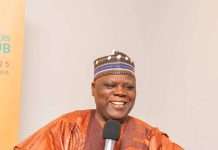
As part of activities to mark the 44th anniversary of uninterrupted monthly publication of Pharmanews, the Publisher and Managing Director, Sir Ifeanyi Atueyi tells MOSES DIKE the story of his foray into pharmaceutical journalism. The 83-year-old pharmacist also reveals how God has led him to survive the vicissitudes of consistently publishing a specialised periodical in a challenging environment like Nigeria. Excerpts:
You are among the first set of pharmacists in Nigeria to bag the B.Pharm degree from a Nigerian university. What was your experience like when you enrolled for this degree and what exactly led you to Pharmacy?
I did not know much or have interest in Pharmacy until after my HSC exams in 1960, at the Dennis Memorial Grammar School (DMGS) Onitsha. In our class of 19 students, everyone had made up their minds on what to study in the university, but since I had no flair for Medicine, which was the popular course, I had no other choice.
Then I heard that University of Ife (now Obafemi Awolowo University, Ile-Ife) was offering a new degree, B.Pharm. I was excited by that degree, and started imagining myself becoming among the first set of graduates of B.Pharm in the country. It was not the practice that appealed to me because I did not imagine myself working in a hospital or running a “chemist” like the ones I knew at Onitsha.
When it was time for university admission, I avoided my uncle who had in mind that I would study Medicine. I applied for B.Pharm in the University of Ife and other courses in the University College Ibadan (now University of Ibadan) and University of Nigeria Nsukka and I was admitted to the three universities.
It was a thing of pride then for parents to have their children become medical doctors and this probably informed your uncle’s desire to have you study Medicine and become a doctor. So how did he react when you went against his wish?
My uncle was disappointed in me for my choice of courses. His plan for paying my fees in the school was to study Medicine and become the first medical doctor in our town, Okija, in Anambra State. But all the time I didn’t have any flair for Medicine or related professions. At that time, I could not even imagine what I would do or become in future.
My uncle engaged me in a heart-to-heart discussion until he convinced me to choose Medicine. By that time, admissions had closed, and I had to wait for the next session, 1962/1963, to apply again.
Following our decision, I returned to Onitsha, with the intention of taking up a teaching appointment at Washington Memorial Grammar School, Onitsha, close to DMGS, my school. However, out of courtesy I decided to inform Dr Rowland Hardman, of the Pharmacy Department of UNIFE, who signed my letter of admission, that I would no longer take up the admission. I was not obliged to inform the university but in my letter I did not disclose that I had decided to go for Medicine. I just said I had no money.
That excuse changed the course of my life. Dr Hardman immediately replied that he had a generous scholarship provided by Pfizer Products Limited for me. This offer was irresistible, and I thought about it deeply for days and believed it was a good reason for my uncle to allow me to go in for the B.Pharm. Consequently, I left Onitsha to see him at Irete, in Owerri.
On presenting the letter of the scholarship offer, we extensively discussed the advantages and disadvantages and short and long-term consequences of my decision. He told me to spend some time to meditate on our deliberation and then give him my final decision. At that time, I was not actually praying but actively thinking. In the morning, I went to him for the crucial dialogue. There, I confidently told him that I had decided to take up the scholarship and proceed to the University of Ife for B.Pharm.
That morning, I returned to Onitsha and explained to the principal of Washington Memorial Grammar School that I would no longer be able to resume, as agreed. Therefore, it is on record that I was employed by the school, but did not teach even for a day and did not earn a kobo before resigning.
My concern was to travel to Ibadan as soon as possible to join other students who had already resumed since September. I joined them in mid-October, 1961.
What exactly fascinated you about the B.Pharm degree?
Honestly, I didn’t know. My desire was to acquire that new degree and become one of the first graduates in Nigeria. It is now that I have realised that, at that time, God had not revealed to me what He planned for me to become in future. At that time, it was not imaginable. I studied Pharmacy for the sake of B.Pharm. God kept away from me the reason He directed me to Pharmacy. It was only in 1978 (17 years after) that He revealed to me His purpose for my life and the reason He made me a pharmacist.
Fortunately or unfortunately, I was among the four students who had second class upper division and were offered the opportunity of proceeding overseas for postgraduate work. Others (namely, Prof. Ajibola Olaniyi, Prof. Bona Obiorah and Dr Femi Sowemimo) readily accepted the offer but my spirit rejected it. It was a success that threatened to take me away from my destiny. If I had joined them, I should have also been a retired professor today, but would I have been able to fulfil God’s plan for my life? Would there have been Pharmanews today? Would I have been the person I am today? Only God knows.
As you mark 44 years of uninterrupted publication of Pharmanews, can you share with us one or two major challenges you have experienced?
As expected, we have experienced many challenges. But in each case, God used it to strengthen or direct us to our destiny. When we started in 1979, we had no money at all to produce the first (May) edition. I approached my colleagues in the industry but none was ready to pay for their adverts in advance.
Then God directed my steps to a company where I didn’t know anybody and had never entered before. The managing director of E. Merk, Mr Ufflabaumer, a German, received me in his office and when I presented my proposal for adverts, he immediately took up the page 2 bottom strip advert and advert on the wrapper. He paid in advance from May to December 1979 and instructed me to reserve the spaces for him and payment to be made in advance every January. It was a miracle to me. This seed money has kept us going till today. We have never borrowed from anybody or bank because God blessed the seed planted by E. Merk.
Another major challenge was towards the end of 90’s and early 2000 when the fake drugs syndrome grounded the pharmaceutical industry. Since Pharmanews depended on adverts from the companies, we also suffered terribly. In fact, we dropped the number of pages gradually, from 60 to 12 and the print-run from 5000 to 0nly 1000. Payment of salaries became very difficult and many staff had to leave. I even advised the editor who was so committed to Pharmanews to find another job because I was myself looking for what else to do.
When the editor left, I started using the name “Christopher Job” as the editor and Ifeanyi Atueyi as the publisher to give the impression that things were still okay with us. Actually, Christopher was my former name and Job the first name of my father. My wife, who had retired since the 70’s, had to join the Expanded Programme on Immunisation (under Dr Mrs Dere Awosika) while I was looking for what else to do.
As God would have it, despite the serious economic challenges, we never missed one edition. It was only in 2001 when Prof. Dora Akunyili was appointed the DG of NAFDAC that things starting changing. If her coming to NAFDAC had delayed for a few months I might have thrown in the towel, contrary to God’s plans.
Having sustained the idea and legacy of Pharmanews for 44 years, where would you like to see Pharmanews in the next couple of years and what innovations should stakeholders expect from the publication?
As long as we endeavour to work according to God’s instructions, Pharmanews will continue to do well. We are only carrying out the vision He gave me in 1978.
In Pharmanews, we work with God-given ideas and that is one thing that has sustained us for 44 years. Those who read Pharmanews must have observed that there is something new nearly in every edition. Our services to our advertisers and readers continue to improve.
The pharmaceutical industry also acknowledges that we are committed to the philosophy of continuous and never-ending improvement. This is what we will keep doing.











Impressive 👍
I am fascinated and challenged by the story of your life journey. It can only be God.